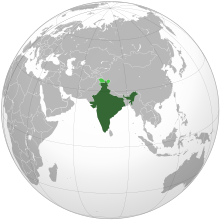LGBT rights in India
|
LGBT rights in India |
|
|---|---|

Area controlled by India shown in dark green;
claimed but uncontrolled regions shown in light green. |
|
| Same-sex sexual activity legal? | Illegal under section 377 of the Indian penal code. Penalty: Up to life imprisonment |
| Gender identity/expression | Legal gender change allowed on SRS. Right to change legal gender to Male/Female/Other without SRS proposed April 15, 2014 and under discussion |
| Military service | N.A |
| Discrimination protections | Legal recognition of third gender |
| Family rights | |
| Recognition of relationships |
No recognition |
| Adoption | Trans* adoptions allowed |
Lesbian, gay, bisexual and transgender (LGBT) people in India face legal and social difficulties not experienced by non-LGBT persons. Sexual activity between people of the same gender is illegal, and same-sex couples cannot legally marry or obtain a civil partnership. India does, however, legally recognize Hijras as a third gender, separate from men or women. The Indian cities of Delhi, Calcutta and Bangalore held their first gay pride parades on July 29, 2008.
Homosexual intercourse was made a criminal offense under Section 377 of the Indian Penal Code, 1860. This made it an offence for a person to voluntarily have "carnal intercourse against the order of nature." In 2009, the Delhi High Court decision in Naz Foundation v. Govt. of NCT of Delhi found Section 377 and other legal prohibitions against private, adult, consensual, and non-commercial same-sex conduct to be in direct violation of fundamental rights provided by the Indian Constitution.
According to a ruling by the Indian Supreme Court, decisions of a High Court on the constitutionality of a law apply throughout India, and not just to the territory of the state over which the High Court in question has jurisdiction. However, even there have been incidents of harassment of homosexual groups.
On 23 February 2012, the Ministry of Home Affairs expressed its opposition to the decriminalisation of homosexual activity, stating that in India, homosexuality is seen as being immoral. The Central Government reversed its stand on 28 February 2012, asserting that there was no legal error in decriminalising homosexual activity. This resulted in two judges of the Supreme Court reprimanding the central government for frequently changing its stand on the issue. "Don't make a mockery of the system and don't waste the court's time," an apex court judge told the government.
On 11 December 2013, the Supreme Court set aside the 2009 Delhi High Court order decriminalising consensual homosexual activity within its jurisdiction. The bench of justices G. S. Singhvi and S. J. Mukhopadhaya however noted that parliament should debate and decide on the matter. The full decision can be found here.
...
Wikipedia
